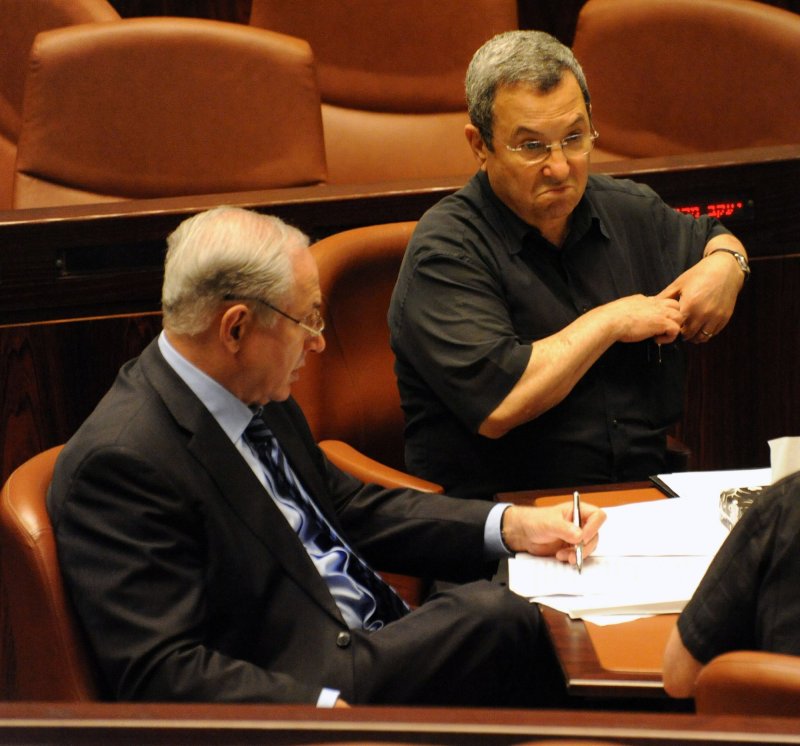Israeli Prime Minister Benjamin Netanyahu talks to Defense Minister Ehud Barak during a session in the Knesset, the Israeli Parliament, in Jerusalem, June 2, 2010. Israel deported activists seized during a raid on the flotilla aid ships today and vowed to stop future humanitarian aid ships from reaching Gaza. The deadly naval operation has brought international outrage on Israel. UPI/Debbie Hill |
License Photo
TEL AVIV, Israel, Oct. 10 (UPI) -- Israel's military chiefs are up in arms over defense budget cuts, claiming these will slow development of vital missile defense systems and immobilize one-third of the air force and 20 percent of the army's tanks.
Israeli Prime Minister Binyamin Netanyahu's right-wing Cabinet voted 21-8 Sunday to approve the cuts that will slash $1.2 billion in defense spending over the next two years.
But the defense establishment, which has fought the cutbacks tooth and nail for several weeks, maintains that in real terms this will amount to a reduction of $2.4 billion.
If that is the case, the cuts will impact heavily on Israel's high-tech defense industry, which supplies many of the military's weapons systems, such as missiles and tanks, and virtually all its electronic systems and ammunition.
The defense cuts had been proposed by a special commission appointed by the government in August to determine far-reaching new spending priorities following a summer of unprecedented nationwide protests demanding more funding on improving social conditions such as housing, jobs and welfare programs while cutting taxes.
Israeli Defense Minister Ehud Barak, backed by the chief of the general staff, Lt. Gen. Benny Gantz, led opposition to the military cutbacks.
But the recommendations of the commission, led by leading economist Prof. Manuel Trajtenberg, were overwhelmingly approved after a sharp debate between Barak and Finance Minister Yuval Steinitz.
"I can vouch for Israel's security and I am responsible," Netanyahu declared. "It's possible to preserve the country's security, even with this change."
Steinitz observed that the defense budget had been raised to $22.5 billion in recent years, so it could afford to be cut.
Indeed, much of the funding for the increase in social spending will come from the defense budget, which until recently had seemed inviolable.
Military sources claimed the cuts could mean "a matter of life or death" as Israel faces the prospect of conflict on several fronts, including a destructive missile and rocket bombardment that could last for several weeks.
They stressed the cuts will slow development of defense systems designed to counter massive and sustained missile attacks.
In particular, they said, it will mean the Defense Ministry will only be able to buy six batteries of the Iron Dome system, designed to shoot down short-range rockets used by Lebanon's Hezbollah on Israel's northern front and by Palestinian militants in the Gaza Strip on the southern border.
Missile specialists say Israel needs at least 20 batteries to effectively cover the nation.
Iron Dome was developed by Rafael Advanced Defense Systems, one of the country's major defense companies. It's also developing another missile defense system known as David's Sling to intercept intermediate-range missiles.
The top layer of a planned three-tier missile shield, the long-range Arrow-2 system built by state-owned Israel Aerospace Industries, has been in place since 2000. It's designed to counter Iran's Shehab-3b and Sejjil-2 ballistic missiles that one day may carry nuclear warheads.
IAI is developing the Arrow-3 that will be able to intercept ballistic missiles much earlier in their flight, beyond the Earth's atmosphere, adding a vital dimension to Israel's missile defense capabilities.
Military sources claim that if funds dry up development of David's Sling, also known as Magic Wand, and Arrow-3 could be halted.
The sources insisted the budget cuts will lead to the "operational grounding" of one-third of the air force's jet aircraft -- virtually all of its strike and support aircraft -- and 20 percent of the army's corps of Merkava 3/4 main battle tanks.
These are manufactured by Israel Military Industries and assembled by the Ordnance Corps.
It's not clear whether the cutbacks will affect the air force's acquisition of Lockheed Martin's stealthy F-35 Joint Strike Fighter. The air force has ordered 20, a deal worth $2.75 billion that will be assisted by the $3 billion in U.S. military aid Israel receives every year.
Ultimately, the air force wants 75 of the fifth-generation fighters to maintain Israel's technological edge over its regional adversaries.
The military's dire warnings were to be expected and may well be aimed at soliciting the support of the Pentagon, which has helped fund key projects Israeli couldn't afford on its own, such as Arrow and Iron Dome.















